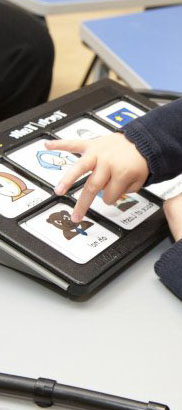
For some pupils on the autistic spectrum just touching their hair can be
exceedingly painful. This is very difficult for others to appreciate, but
we must accept it as fact.
The point about this is not that those with PMLD
will be touch defensive, but they most certainly may be. Their defensiveness
could be so strong that certain types of touch may cause actual pain. We
must therefore be cautious if the learner reacts in a negative way.
The basic questions to ask are:
- Is the learner touch defensive?
- If so where? We tend to concentrate on the hands but there may well be sensitivity elsewhere that might restrict exploration and indeed might make the learner very nervous around people – in case someone touches them. Not liking people being close to you is not going to help with learning.
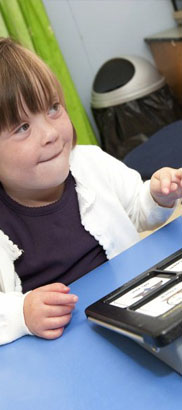
Things that teachers should remember:
- We need to be very sensitive to touch defensiveness and treat
it like a
phobia – in other words, desensitise very slowly and with sensitivity to an individual's aversions. The problem could be a big hurdle for those who are very touch defensive. It could take many years to effect change. You may want to consult an occupational therapist on the best way to do this. - Firm pressure is usually much more acceptable than gentle touch, especially when desensitising.
- Wear something personal to you to help learners identify you. It is always good to introduce yourself with a touch cue, such as your special bracelet, or your curly hair, or your beard, or your glasses etc., which will support and enhance the visual and auditory cues naturally given.
- For some, as for those on the austistic continuum, touch can be really stressful.
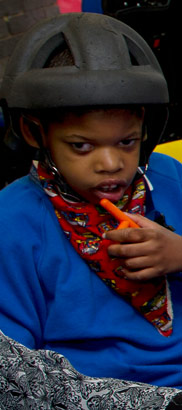
The mouth is an extremely important tool for early sensory exploration.
The enjoyment of food and taste can be a source of considerable satisfaction,
especially for those who might find other sensory pleasures difficult to
attain.
We need to provide as many opportunities to engage in this aspect
of learning as we can.
For oral and taste issues, the basic questions to ask are:
- Does the pupil have an eating and drinking programme? And if so, do all those who are likely to work with them know it thoroughly? Consistency of approach is vital. You will need to work closely with a SALT to ensure the correct approach and continued progress.
- What are their favourite foods and drinks? Detailed knowledge of pupils' likes and dislikes are excellent for teaching about choice making because most pupils are naturally very motivated by food.
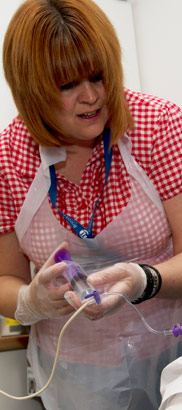
Food and liquids entering the lungs instead of the stomach is unfortunately
a very common reality for those with PMLD.
The gastrostomy (feeding tube) is an extremely effective method of sustenance
for those with breathing difficulties, but we need to work closely with
a SALT to ensure that
pupils can continue to taste as often and as widely as possible.
Things to remember:
- Mouthing is part of tactile exploration, but the combination of
taste and touch (by tongue) forms a major part of early discovery
(Mednick, 2002; McLinden and McCall, 2002). - The important thing is not to discourage mouthing. Don't worry too much – within reason – about learners eating things such as glue, paint, paper and materials as long as you're sure about choking and other safety issues.
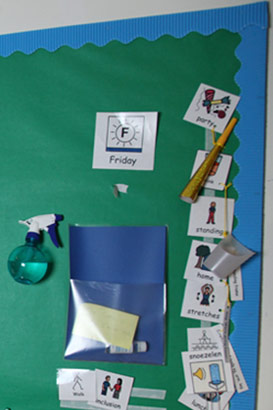
For smell, the basic questions to ask are:
- Are you giving learners an opportunity to practise and refine their sense of smell in the same way as for touch?
- Are you giving learners the opportunity to practise smelling before they taste and eat?
Things to remember:
- Try to be consistent with your own scent: don't change your perfume and deodorant. It can be an excellent additional cue as to who you are, especially for the visually impaired.
- Smell is the most difficult sense to use selectively. It should be used sparingly.
- Smells such as joss sticks cannot be withdrawn easily and can therefore hang around for a while!
- Try using a smell a day to cue students into each day of the week – if it's vinegar, it must be Friday.

McLinden, M. and McCall, S. (2002) Learning Through Touch. London. David Fulton.
Mednick, M. (2002) Supporting Children with Multiple Disabilities. Birmingham. Questions Publishing.